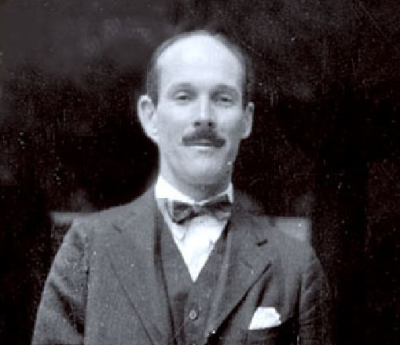Remembering J. B. Trend ��� an unlikely Spanish don
By GEORGE BERRIDGE
The internet is a terrible tool for the easily distracted. How can I possibly respond to emails when the "Random Page" button on Wikipedia exists? Then there���s the time lost on sub-articles, essays and dusty corners of the Amazon bookstore. But occasionally, there can be some real reward in pulling on the thread.
Readers of this week���s issue may have noticed the wonderful letter on The Magic Flute in our "From the Archives" section. Sent to the TLS from the Somme in July 1916 by Lieutenant John Brande Trend, it is an archetype of the form: incisive, informative and witty. Printed when contributions to the paper were anonymous, he signs off MONOSTATOS, B.E.F. (British Expeditionary Force). When you read the date, the worry strikes: did he make it through to the day the guns fell silent? Yes, it emerges, and then some. Not only did he survive the war, but he also went on to pursue his love of Hispanic studies, becoming the first professor of Spanish at Cambridge, a position he held until 1953. (He died in 1958.)
A man of such learning and distinction must surely have graced these pages again? Sure enough, a search of our archives shows that he began reviewing for the TLS in 1919, again demonstrating his knowledge of Mozart, in a review of Michele Scherillo���s book on Neapolitan comic opera. As browser tabs pile up, I come across a reference to him in the collected letters of another reviewer who started writing for the TLS in the same year: Thomas Stearns Eliot. In a footnote I discover that the pair became acquainted in the summer of 1922. In the letter it refers to, dated January 18, 1923, T. S. writes to J. B., who was spending a great deal of time on the Continent:
I had been wondering whether I should hear from you, and whether you had returned from Spain (though I had seen one or two things I thought must be by you, in the TLS) and had been for some time on the point of writing to you. Remember that I have been counting on you, if on anyone, to report to me some treasure from Spain which might be exploited for the Criterion.
Trend began writing for Eliot���s literary magazine in 1924.
Back to the archives. In 1928, we find him passing judgement on V. S. Pritchett���s book Marching Spain.
It is interesting to see how Spain grows upon the author, how the mere fact of being for some time in the country gradually impels him towards directness of expression; and when, towards the end of his stay, his imagination is stirred, he can write naturally and convincingly, without the necessity of that ostentatious jewelry of phrase and metaphor which has spoiled some of the best of his earlier pages.
In July 1933, Eliot writes to Philip Radcliffe, a fellow of King���s College, to ask if he would like to compile a quarterly "Music Chronicle" for the Criterion ��� taking the responsibility over from Trend, who was beginning his job at Cambridge. J.B. had put forward Radcliffe���s name (���I warmly endorse his nomination���).
Trend���s position at Cambridge came in no small part thanks to the help of his lifelong friend Edward Dent, the same Mr Dent he refers to in the Somme letter. Dent had been Professor of Music at the university since 1926. In Duet for Two Voices: An informal biography of Edward Dent compiled from his letters to Clive Carey, I learn that it was Dent who convinced J. B. to visit Spain and write about music. The two lived together in London in the early twenties and, when Dent died in 1957, Trend acted as his friend���s executor. Trend���s final piece for the TLS was published in the issue of February 19, 1944. Under the title "The Poet in Power", part of a series of articles on Latin American books, he praises a biography of the poet and intellectual Franz Tamayo: ���No book could do more to show a European what Bolivia really is than this���.
His love of the country had a notable effect on one of his Cambridge students, Margaret Anstee ��� later Dame Margaret Anstee ��� who died last week at the age of ninety. She had travelled the world as a diplomat for the UN, becoming Under-Secretary-General in 1987. In her last years she divided her time between Herefordshire and "the shores of Lake Titicaca���. It was in the latter location that she sat down to write her memoir, Never Learn To Type: A woman at the United Nations. The photograph that accompanies her Guardian obituary shows her presenting a copy of the book to Kofi Annan. Brenda Maddox applauded it in the TLS of May 30, 2003: ���For a woman of rare achievement, the least of her distinctions is remarkable���.
It was not Anstee's only book: in 2013, her biography of her ���beloved professor��� Trend, JB ��� An Unlikely Spanish Don, was published by Sussex Academic Press. As a review in the newsletter of the British Association of Former United Nations Civil Servants points out: ���JB (as he was generally known) had an immense circle of literary and musical friends [including HG Wells, John Maynard Keynes, Albert Einstein, Marie Curie, Le Corbusier and Igor Stravinsky], he poured tireless energy into his many projects, influenced many people and yet by the early 21st century, Trend was virtually forgotten, even in his old Cambridge college���. I hope that, in sharing this colourful history, I can help to revive his memory.
Peter Stothard's Blog
- Peter Stothard's profile
- 30 followers




